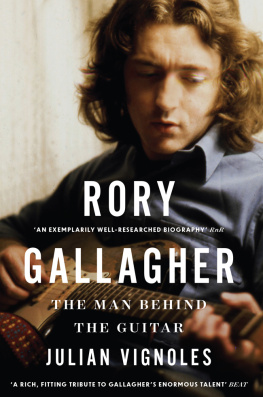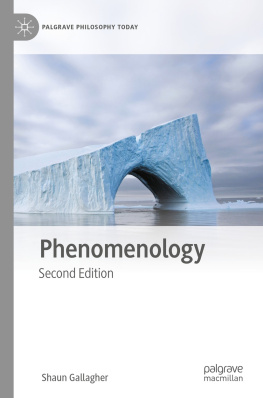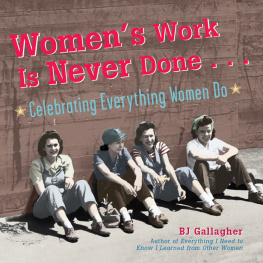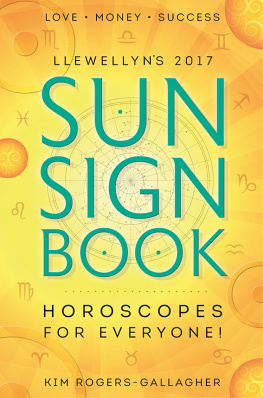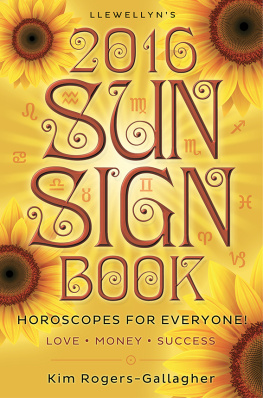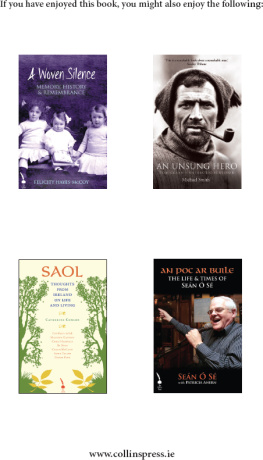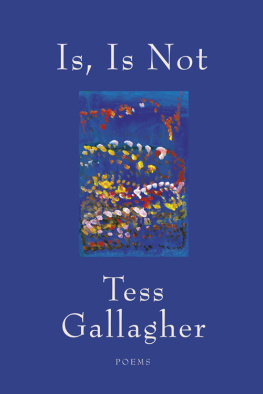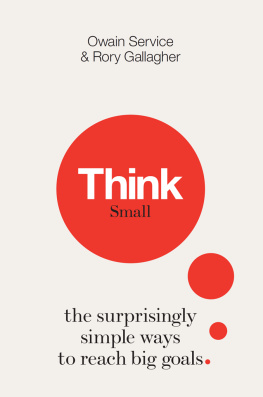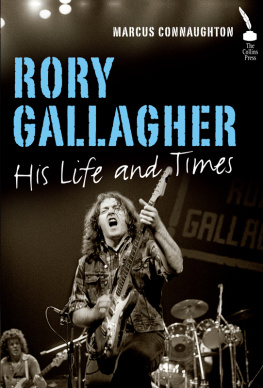RORY GALLAGHER
THE MAN BEHIND THE GUITAR
Julian Vignoles
Gill Books
For my family, Carol, Eoghan and Rory,
and for Rory Gallagher fans everywhere
Contents
RORY GALLAGHER TIMELINE
| 1948 | Born 2 March, in Ballyshannon, County Donegal. |
| 1949 | Moves to Derry (Londonderry) with his parents; his brother, Dnal, born. |
| 1958 | Moves to Cork with his mother and brother, enrolled in the North Monastery primary school, Cork. |
| 1963 | Joins the Fontana Showband, buys his famous Fender Stratocaster. |
| 1965 | Completes his Leaving Certificate at St Kierans School; Fontana becomes Impact and travels to Spain for six-week residency. |
| 1966 | Impact disbands; Gallagher plays gigs with The Axills; in August, forms Taste (The Taste), with Eric Kitteringham (bass) and Norman Damery (drums). |
| 1967 | JanuaryMarch: Taste play in UK and Germany. The band moves base to Belfast. |
| 1968 | Re-forms Taste (known as Taste Mark 2), with John Wilson (drums) and Richard McCracken (bass). November: the band plays support at Creams farewell concert. |
| 1969 | Taste released. |
| 1970 | August: Taste play the Isle of Wight Festival. On theBoards released. December: the band plays its last gig. |
| 1971 | January: the first Rory Gallagher Band line-up, with Gerry McAvoy on bass and Wilgar Campbell on drums; his brother, Dnal, becomes his manager; first solo album, Rory Gallagher, released. Deuce follws later in the year. The Rory Gallagher Band begins twenty years of prolific touring. |
| 1972 | Wilgar Campbell is replaced by Rod deAth, Lou Martin (keyboards) joins the band. Live in Europe released. Gallagher voted best guitarist by Melody Maker readers; contributes to London Muddy Waters Sessions. |
| 1973 | Releases two studio albums, Blueprint and Tattoo. His touring schedule peaks with 160 gigs. |
| 1974 | Completes Polydor contract with double album Irish Tour 74. |
| 1975 | Signs with Chrysalis Records and releases Against the Grain. |
| 1977 | Headlines the Macroom Mountain Dew Festival (the first of two years). |
| 1978 | Abandons an album recorded in San Francisco, reverts to a three-piece band, replacing Rod deAth with Ted McKenna, and later releases Photo-Finish. |
| 1981 | Ted McKenna is replaced by Brendan ONeill. |
| 1982 | Chrysalis contract ends with Jinx. |
| 1985 | Starts his own record label, Capo. |
| 1987 | After a gap of five years, Defender is released. |
| 1990 | Releases his last album, Fresh Evidence. |
| 1992 | August: his final Dublin performance, at the Temple Bar Music Festival. Forms the last Rory Gallagher Band line-up, the first without Gerry McAvoy. |
| 1993 | November: plays for the last time in Cork. |
| 1995 | January: plays at Nighttown, Rotterdam, and collapses. |
| March: admitted to hospital. |
| April: receives a liver transplant at Kings College Hospital, London. |
| 14 June: dies from an infection. |
| 19 June: funeral and burial in Cork. |
MONTREUX, SWITZERLAND, 18 JULY 1979
Theyve been playing it for eight minutes, but Gallagher and the band keep pounding out the Shadow Play riff. It is nearly time to end it. But instead, this time he spurs on the band and increases the pace. He pulls down two drum microphone stands. With the guitar at fever pitch and feeding back, he whips it off and places it on the stage. He begins a kind of primitive ritual as the instrument howls and the band keeps playing. Gallagher is paying homage to his guitar. He skips across the stage, gestures to the crowd, animatedly pointing back at the stricken instrument, appearing to accuse it of something, perhaps of dominating his life? He walks towards it in mock military step, and talks to it, this thing that he had mastered, and which had brought him so much fame. He grabs a white towel and fans the air around the Fender, adding to the electronics distress, before waving the fabric at Gerry McAvoy and Ted McKenna the bass and drums men as if to cool them down from the fever pitch he has just engineered. Bouncing out front again, he drags his precious Stratocaster across the stage, by its cable. The strings screech, as if in protest. Ten minutes have passed, and the ritual is complete. He picks it up deftly and returns to the riff with an air of triumph, before the trademark, multi-crescendo ending, and the words, Thank you, thank you. Goodnight!
INTRODUCTION
There are certain nights that we all have, where you think, God, these hands will do anything tonight! You know, and you take yourself right to the edge, the limit.
RORY GALLAGHER
H e bounded across countless stages in a red check shirt. His compulsion was to entertain. The tones he could conjure from six strings made him a revered virtuoso. He was an unassuming star, courteous and polite. He was Rory Gallagher.
Blues, boogie, folk and rock n roll fuelled the songs. In each, the guitar took its anticipated excursion the famous Gallagher solo. For his fans, this is where he could make it talk both to them, and to him, it seemed. Night after night, gig after gig, hes still thrilled by the sounds he can coax from it, a reviewer, Mick Rock, wrote in Rolling Stone in 1972.
Passion, both his and his fans, was never in short supply. Its what marked him out most, perhaps.
Rory Gallagher was just 47 years old when he died, and during his short life he experienced stardom, jubilation and loneliness. Unlike most of his rock peers, there were no wild parties, no expensive entertaining, no marriages or divorces. He was dedicated almost exclusively to music, particularly to the guitar and its possibilities. It was his lifes purpose. His brother, Dnal, once described it as a vocation. The rock n roll lifestyle wasnt for him. He disliked the mansions and cars associated with rock music fame, further endearing him to many, of course. When he eventually bought his own home in London, it was a modest apartment.
Gallaghers personal life, or his life outside music, is a puzzle. He avoided discussion of the subject and, though he gave many interviews, most of these were promoting tours or records, and give only occasional insights into Rory Gallagher. This guarded aspect of his persona makes the rare occasions when he was revealing more noteworthy. And theres another feature of Gallagher, one that is perhaps unique in the rock world: it is difficult to find a negative word written about him anywhere. Yet Gerry McAvoy, Gallaghers bass player for twenty years, spoke from experience in the introduction to his book, Riding Shotgun, published in 2005, describing his friend as a mystery wrapped up in an enigma. He says there were people that would place Rory on a pedestal with some of the most venerable Irish saints, but, Im here to tell you that he could be one of the most exasperating, frustrating and infuriating people you could ever meet. But also, without doubt, one of the nicest.
There were two very different, distinct sides to Rory Gallagher. He was the artist, the extrovert, the musician who gave his all and more when on a stage, but offstage, there was the shy, polite and gentle individual. And even his confident onstage swagger was tempered with vulnerability; he would often introduce a song with the self-deprecating line, This is one from a few years back I hope you like it. In a life of both success and struggle, Gallagher experienced the paradox of adulation and solitude side by side. Perilously for his personal life, he admitted living for the time he spent onstage. Performance was almost an addiction, and maybe even an escape. Avril MacRory, a TV producer who got to know him, says. There were always people there for him if he wanted them. But one of the reasons he was such a great musician was because thats where it all came out. Thats where he expressed everything. His songs are key to understanding Gallagher. Often seen as vehicles for his guitar playing, much of his lyric writing reveals the mind and soul of its author. He was 21 when he wrote lines for Tastes album

